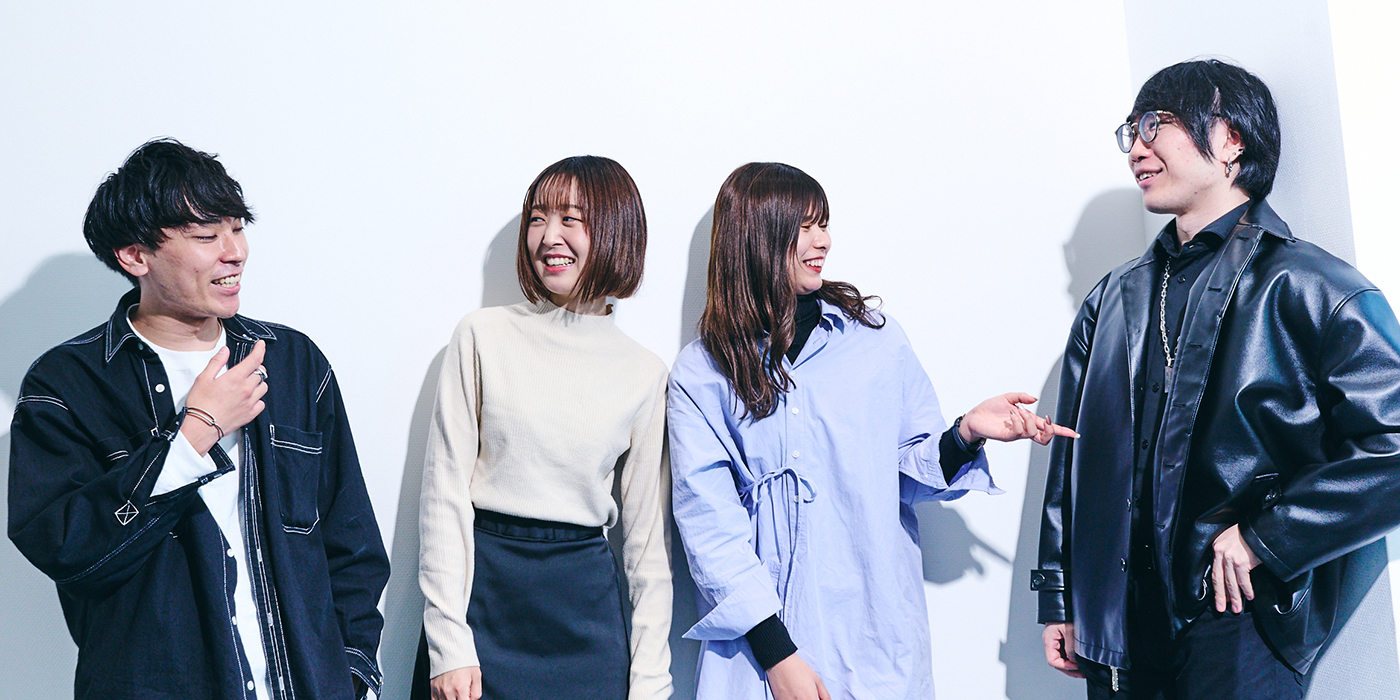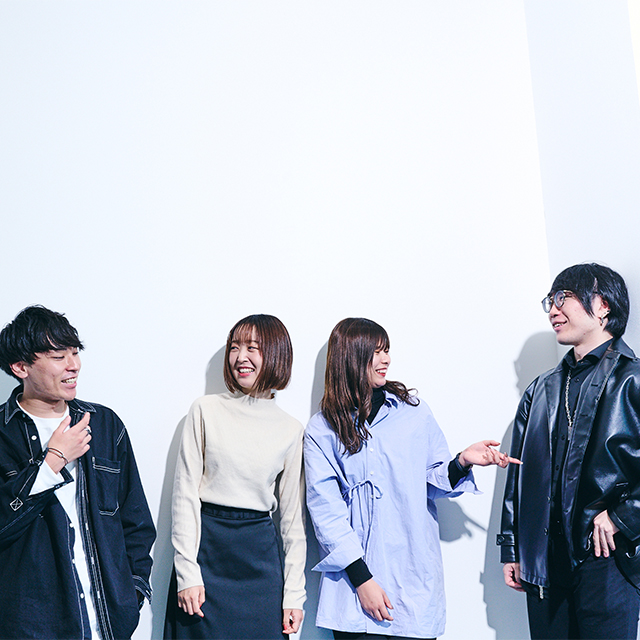While the entertainment industry as a whole has been greatly affected by the coronavirus, Avex has launched a variety of innovations in 2021 just as they did the year before. And speaking of things done the year before, we sat down again with four new Avex employees fresh out of university, the second wave to have entered the company during the pandemic. Throughout the interview, we were able to get insight on new forms of entertainment unbarred by pre-existing concepts— views that only Generation Z could come up with.

From left: Yuta Ishimoto, Yuma Hasegawa, Rin Kasai, Eita Hashizume
"I was asked to solve problems that only I could, being a university student only a few months prior."

Just like in 2020, these four graduates joined the company in the midst of the pandemic, when the majority of events and concerts were either canceled or postponed. They had no choice but to keep up with the irregular developments and the tasks that arose—tasks that would have otherwise been done in conjunction through close communication with bosses, superiors and colleagues. So what was going through their minds at the time?
Hasegawa "I was assigned to the Avex Communications Broadcasting company, which operates dTV, but there were many employees working from home due to the pandemic, and there were hardly any senior employees in the office even though it was my first day of work. Still, I tried to be active and openly communicate with others in the office to remember their faces as much as possible."

Ishimoto "I am in charge of informative TV program promotions at the Central Promotion Group in the Label Division. The system is set up so that one senior employee is assigned to one new employee as a 'trainer' and individual meetings were held online frequently, so there was no major anxiety when starting work."
While taking their first steps as Avex employees, these four are already moving to establish their own positions in the respective roles they have been assigned.
Kasai "I belong to the Business Alliance Headquarters No. 1 Alliance Sales Group, but I have just recently been able to make appointments and interview companies by myself. With one project, I was asked to solve problems that only I could, being a university student only a few months prior to that, and I felt a certain kind of conviction, like 'this is what is needed of me right now'."
Hashizume "I am in A&R in the Second Creative Group of the Label Division, working with artists like the Ohashi Trio and Miyuna. The company naturally thinks about sales when it comes to music production, but from the artist's point of view, they want to show the world what it is they want to make. It's our job to work out the friction between the two and make a good fit. Through working with these two artists, who have completely different careers and musicality, I'm absorbing a lot, especially when it comes to communication."
“After the pandemic became a new norm, people have started to look more at the essential things in life.”

At the same time, we can't deny the fact that the change in our everyday lifestyles has drastically affected the entertainment industry as well. Common sense has been turned on its side with more and more live performances being distributed as videos for people to enjoy anywhere with their smartphones. Let's see what these four think about this.
Ishimoto "I feel that the wind has changed directions. People used to take going to concerts for granted, but now that they're so few and far between, people have come to realize just how important live music is. As a result, there's been a relative increase in the value of live performances, and there is more excitement and passion going into them than ever before."
Hasegawa "Speaking of live performances, another thing that is unique to online concerts is displaying the viewers' comments on the screen behind the performers, like they do when live streaming idol group performances. With real life audiences, you can shout and wave, but you can't do that online. The whole idea of showing what the audience is thinking and feeling through a device via text was made possible thanks to the pandemic.”
Kasai "In my case, and this may be because I work mostly in B2B, but I feel that after the pandemic became a new norm, people have started to look more at the essential things in life, rather than what's in style. Companies are no longer doing something just because it's popular, but they're watching and picking up on the flow of people who are simply doing what's essential for them, and providing it in the form of entertainment. I'm learning a lot about how Avex is able to commit to these discoveries.”

“From here on, we'll need to consider social situations even more when coming up with ideas for hits."
The changes during the pandemic have been tremendous. Naturally, this has presented various issues to these four newly grads.
Hasegawa "I am one of the people in charge of advertising for dTV, Avex's video distribution service. It's one of the areas where demand has increased due to the coronavirus. However, in the post-pandemic world we're in now, the value of real-life experiences such as concerts has increased relatively, so we have to make sure to convey the enjoyment unique to online viewing even more."
Ishimoto "Take audition TV programs for example. They became quite popular during the pandemic, right? I think it's due to people spending more time watching TV from having to stay at home. From here on, we'll need to consider social situations even more when coming up with ideas for hits. Of course, providing quality things is still important, but we have to think about people's movements and the state of the world we're in."
“More entertainment options mean more competition.”

Change in entertainment continues to accelerate after the pandemic. Advances in technology have blurred the borderline between real and virtual, and the structure of mass media, which has long revolved around television, is also changing. In a world where everyone can create and put out music and videos in an instant, what does Avex's next step look like?
Hasegawa "So we have more options of entertainment now, right? On the other hand, we can also say the number of competitors has increased. So when we think about how we can get users to choose Avex, I think it would be awesome if we're able to, for instance, provide live performances in the form of streaming for people living in rural areas who can't physically make it to the concert, with little or no difference in value than if they were actually there."
Ishimoto "I feel that we must dig as much as possible into what kind of target we want to deliver to and create content that can give back to each and every fan, because the legacy media centered approach won't work by itself anymore. It won't be enough to just get on the radio, or TV, or on stage. A little while ago, people might have thought an artist was popular and raking it in simply for being featured in the media, but now we need to take a hard look at and pursue exactly who is enjoying the content and in what kind of environment."
“It's not enough for their music to have that Avex sound to it. I think it will be better to have more diversity.”
On the other hand, some voices expressed a need for change in Avex as a company in regards to the transformation and globalization of the entertainment industry, which had been progressing long before the pandemic.
Hashizume "In the past, major artists swept the charts, but recently there have been more and more artists working independently, almost as a way to go against the grain. So, I hope that Avex will be able to respond more flexibly in response to these independent artists. When the average person hears the name "Avex", I think there's a common 'Avex-like' image they get. But when the image of something becomes fixed, that thing is only able to shine within the boundaries of that image. It's not enough for their music to have that Avex sound to it. I think it will be better to have more diversity. Gradually being able to adjust the colors and hues of the corporation that way would be great."

Ishimoto "If we were to launch new entertainment from Japan to the world, like, for instance, Korea did with their now world-famous K-POP, it's not enough for us to do what others are doing. I think we have to take an approach that allows the world to embrace something unique to Japan, like City Pop and Anime, which have gained popularity around the world in the past few years."
Kasai "I also think that the details one finds in Japanese expression are amazing. It comes across in the music and video work of individual artists. I would like to further spread that kind of stuff to the world."
Hasegawa "Of course if you compare Japan with the rest of the world in terms of scale, Japan falls short in some aspects. So if we're able to convey the individuality and unique culture of Japan, for example, as Anime does, we might be able to create a new "Japanese brand" of entertainment. To that end, I hope to expand the possibilities more and more using digital media."
“Accept change as something natural. while seeking new value.” While interviewing these four young individuals one couldn't help but feel this common insight—an almost enlightened stance—come through. You might say that it is a unique quality of theirs, to have grown up in the whirlpool of change that started with the explosive spread of the internet in the late 1990s. We look forward to seeing what kind of content these four will come up with at Avex, as they dive into the entertainment world—a world of providing pleasure—in these difficult times.

(From left)
Avex Entertainment Inc.
Yuta Ishimoto
Avex Broadcasting & Communications Inc.
Yuma Hasegawa
Avex Entertainment Inc.
Rin Kasai
Avex Entertainment Inc.
Eita Hashizume









